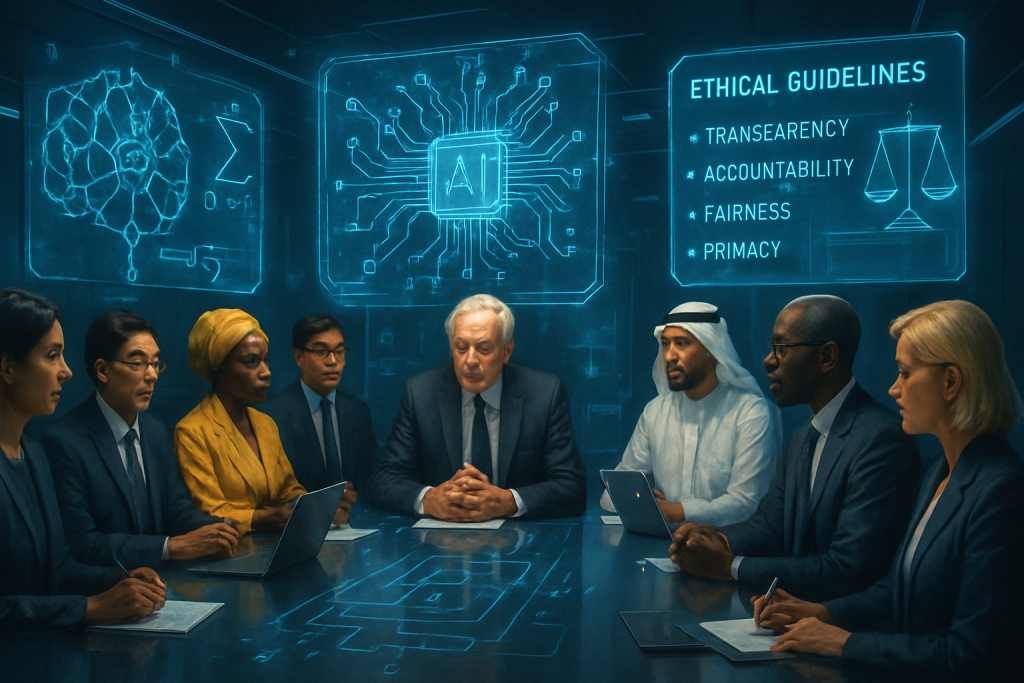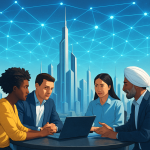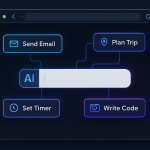The year is 2025. Self-driving cars are (mostly) keeping us safe, AI-powered doctors are diagnosing diseases with uncanny accuracy, and your smart fridge is probably judging your late-night snack choices. But behind the scenes of this AI-powered utopia (or dystopia, depending on your perspective), a silent struggle for control is underway. And that struggle just took a major turn at the World Artificial Intelligence Conference in Shanghai.
Imagine the scene: Geoffrey Hinton, the godfather of deep learning, nodding sagely in the audience. Andrew Yao, Turing Award winner and all-around computer science royalty, listening intently. Tech titans from Alibaba, Google, Huawei, and countless others filling the hall. The air crackles with anticipation as Chinese Premier Li Qiang steps to the podium.
What followed wasn’t just another speech about innovation and disruption. It was a proposal that could reshape the entire landscape of AI development: the creation of a global AI cooperation organization.
Think of it as the United Nations, but for algorithms. A place where countries can (theoretically) come together to hash out the rules of the AI game, ensuring that this powerful technology benefits humanity as a whole, and doesn’t just become a weapon in the hands of a few.
But before we start picturing world peace achieved through perfectly optimized neural networks, let’s unpack what this proposal really means, and why it matters.
The current state of AI governance is, to put it mildly, a mess. It’s like a digital Wild West, with different countries and companies setting their own rules, leading to a fragmented and often contradictory landscape. You might have one set of regulations in the EU, another in the US, and something completely different in China. This lack of coordination creates uncertainty, stifles innovation, and opens the door to potential abuses.
Premier Li’s proposal is an attempt to bring order to this chaos. He argued for a “universally recognized framework” to guide AI development and security, emphasizing the need for collaboration to mitigate risks and ensure responsible advancement. In essence, he’s suggesting that we need to build the guardrails for AI before it careens completely out of control, a bit like setting up traffic lights before everyone buys a driverless car that can go 200mph.
Now, you might be thinking, “Sounds great! What’s the catch?” Well, there are a few. And they’re big ones.
The first, and perhaps most obvious, is trust. Can countries with vastly different political systems and values really agree on a common set of AI principles? Will this organization become a platform for genuine cooperation, or just another arena for geopolitical maneuvering? It’s a bit like trying to get the Lannisters and the Starks to agree on a joint investment strategy. History suggests it won’t be easy.
The second is control. Who gets to decide the rules? Will this organization be dominated by a few powerful nations, or will it be a truly inclusive body that represents the interests of all stakeholders? There are legitimate concerns that major powers, particularly those with significant AI capabilities, could use this organization to advance their own agendas, potentially stifling innovation and creating an uneven playing field.
And then there’s the question of enforcement. Even if countries agree on a set of principles, how will they be enforced? Will there be sanctions for violations? Will there be a global AI police force patrolling the digital highways? It’s all a bit reminiscent of the early days of the internet, when everyone was excited about the possibilities, but nobody quite knew how to deal with the trolls and the spammers.
The implications of this proposal are far-reaching. A successful global AI cooperation organization could foster innovation, promote ethical development, and prevent the misuse of AI. It could help us tackle some of the biggest challenges facing humanity, from climate change to healthcare. It could even pave the way for a future where AI truly benefits everyone.
But a failed organization, or one that is dominated by a few powerful players, could have the opposite effect. It could stifle innovation, exacerbate inequalities, and even lead to a new kind of digital arms race, where countries compete to develop the most powerful and potentially dangerous AI systems.
The coming months and years will be crucial in determining the fate of this proposal. Will countries be willing to put aside their differences and work together to build a better future for AI? Or will they continue down the path of fragmentation and competition, risking a future where AI becomes a force for division and destruction? Only time will tell.
One thing is certain: the stakes are incredibly high. As Uncle Ben famously said, “With great power comes great responsibility.” And AI, with its immense potential, is arguably the greatest power humanity has ever created. It’s up to us to ensure that we wield it wisely.
Discover more from Just Buzz
Subscribe to get the latest posts sent to your email.


